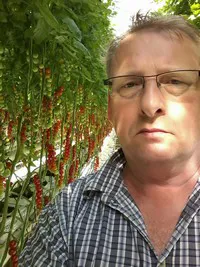
Jos Reeuwijk, former grower and now adviser on LinkedIn: "Real growers with years of practice experience that can make the difference and can train people will be difficult to find in the near future." It is his reaction to the TV-segment with tomato grower Leo van der Lans last Sunday. The segment stirred something up, and so does Jos' blog, looking at the reactions.
In his blog, Jos raises the question whether the profession 'grower' will still exist in the near future. Because of scale enlargement, the smaller cultivation companies have disappeared, and with them the old school growers. Greenhouse horticulture has turned into a 'mass production industry'.
A development which is not only happening in the greenhouse horticulture. "It is happening in a lot of sectors where the knowledge of older employees is no longer appreciated, while in greenhouse horticulture you can produce more kilos of a crop with precision crop control, and recuperate the investment in a salary of such a mentor or older employee with experience, call him a coach, in no time."
Standardization
New growers are being trained for the 'industry' in which the greenhouse horticulture is slowly turning into, although the number of registrations for horticultural education is lower than the demand. And graduates combining cultivation knowledge with IT-knowledge are almost impossible to find. There is IT-knowledge, for example, look at the Autonomous Greenhouse Challenge, growers can no longer do without.
"In that challenge, no one can enter the greenhouse, and that is where things go wrong when compared to original growers with green fingers. "A grower should walk amidst the crop, to read the plants and feel the climate. Best in shorts, because you have to experience how the climate feels for a certain crop." Jos would like to engage the teams in the challenge. "I think I can achieve a higher production."
Company robot
Jos has his doubts about the cultivation knowledge of the new generation growers. "They have a lot of theoretical knowledge, can they 'read' a plant as the original growers can, who have learned the trade from father to son? How many real growers can still look at a plant and see what is wrong, which nutrients are lacking, and how you can achieve top production by paying attention to details?
The 'real growers' can still be found and they want to work, but they cannot keep up with the tempo of foreign crop employees and are therefore not interesting for production companies, Jos observes. "Now, production companies are not looking for top production, but for standardization, because with a standard cultivation plan, everybody can grow."
And that hurts a little. "Yes, wherever you see the human factor disappear, it hurts. Look at the care industry where aid workers are replaced by a company robot..."
Knowledge export
Jos does see the importance of automation. "Labor is going to be a problem in the Netherlands for the continuity of companies. I am holding my breath. What if employees are no longer coming from Poland? Where will they come from?"
Automation cannot replace that 'standard' labor and Jos recognizes that that is essential for the agriculture sector in general, and the greenhouse horticulture in particular. "But to then make the difference, you have to achieve higher production and better quality, and for that, human knowledge is essential. If you let that go (and Jos sees a lot of cultivation knowledge being exported abroad), other countries will overtake you."
Theoretical basis
The before mentioned standardization is accompanied by a theoretical basis. Back to the blog for a moment. The reactions below agree. Whether higher education is a requirement for this is a topic of debate. But the practice cannot be forgotten, everybody agrees. Jos: "I am of the opinion that passion for the trade can take you further than a book."
For more information:
Jos Reeuwijk
LinkedIn
